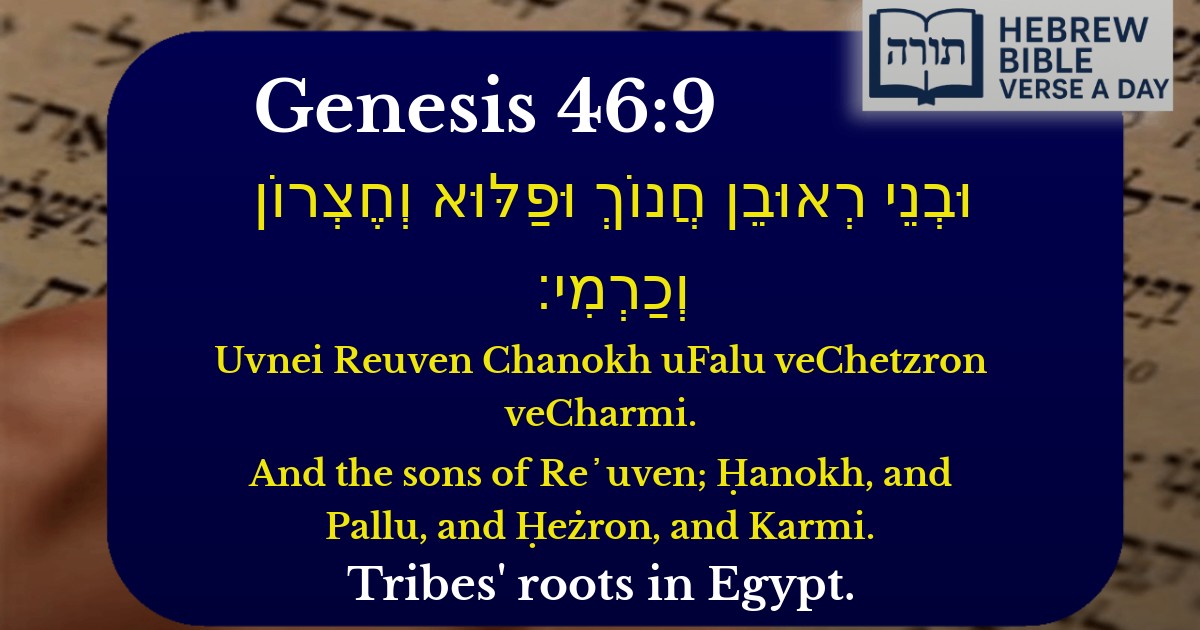Frequently Asked Questions
Q: Who were the sons of Reuben mentioned in Genesis 46:9?
A: The sons of Reuben mentioned in Genesis 46:9 were Ḥanokh (Enoch), Pallu, Ḥeżron, and Karmi. These were the four sons of Reuben, the firstborn of Jacob, as recorded in the Torah. Rashi notes that these names are significant as they represent the lineage of the tribe of Reuben, which later became one of the twelve tribes of Israel.
Q: Why is the lineage of Reuben important in the Torah?
A: The lineage of Reuben is important because it establishes the foundation of the tribe of Reuben, one of the twelve tribes of Israel. According to traditional Jewish sources like the Talmud and Midrash, each tribe had its unique role and destiny. Reuben, as the firstborn, had a special status, though he later lost some privileges due to his actions (as explained in Genesis 49:3-4). The listing of his sons in Genesis 46:9 helps trace the tribal genealogy.
Q: What can we learn from the names of Reuben's sons in Genesis 46:9?
A: The names of Reuben's sons—Ḥanokh, Pallu, Ḥeżron, and Karmi—carry meanings that reflect themes in Jewish tradition. For example, Ḥanokh (Enoch) is related to the Hebrew word for 'education' or 'dedication,' suggesting a legacy of teaching. The Midrash often explores the significance of names, showing how they can hint at a person's character or destiny. While the Torah doesn't elaborate on these individuals, their names are preserved as part of Israel's sacred history.
Q: How does the listing of Reuben's sons apply to Jewish tradition today?
A: The listing of Reuben's sons in Genesis 46:9 reminds us of the importance of family lineage (yichus) in Jewish tradition. Even today, many Jews trace their ancestry back to the tribes of Israel, and some customs (like priestly blessings for Kohanim and Leviim) are tied to tribal heritage. Rambam (Maimonides) discusses the significance of tribal identities in Jewish law, showing how these ancient lineages still hold meaning in Jewish life.


The Sons of Reuven in the Torah
The verse (Shemot 6:14) lists the sons of Reuven, the firstborn of Yaakov Avinu: Chanokh, Pallu, Chetzron, and Karmi. This lineage is significant in establishing the tribal structure of Bnei Yisrael.
Rashi's Commentary on the Names
Rashi (on Shemot 6:14) notes that these names are repeated here to emphasize the importance of tracing lineage, particularly for the tribe of Levi (which follows in the subsequent verses). He explains that the Torah reiterates Reuven's sons to connect the genealogical record to Moshe and Aharon, who descend from Levi.
Symbolism of the Names
Reuven's Legacy in the Tribes
The Ramban (on Bereishit 46:9) explains that although Reuven lost his firstborn rights due to his actions (Bereishit 35:22), his descendants still held a prominent position among the tribes. The listing of his sons here reinforces that his lineage remained integral to Klal Yisrael.
Halachic Significance
The Talmud (Bava Batra 109b) discusses how the order of inheritance follows the listing of sons in the Torah. Thus, this verse establishes the precedence among Reuven's descendants in matters of yerushah (inheritance).